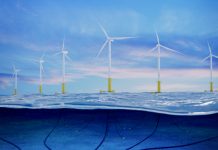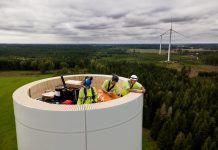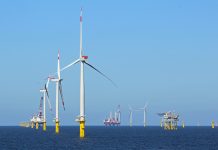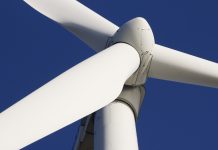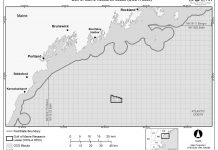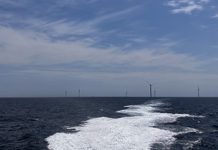Floating foundations for the offshore wind industry are increasingly gaining attention and interest within the industry, as well as among government and permitting institutions and also investors. This interest is driven by the conditions found in the U.S. and Japan where the vast majority of offshore wind resources is found in water depths of more than 100 meters. There are also areas in Europe where conventional foundations such as monopiles, tripods, gravity foundations, and jackets are not applicable, especially for planned installations further offshore.
A consortium led by GICON Grossmann Ingenieur Consult GmbH has developed a floating platform solution that addresses the global offshore wind industry’s need for floating foundation technology. Unlike other technologies currently under development, the GICON Floating Offshore Foundation (FOF) is not only applicable in deep water but can also be deployed in shallow water depths of 25 meters and deeper. “This versatility addresses a number of key challenges,” according to Prof. Jochen Grossmann, owner and CEO of GICON GmbH. “The existing foundation technologies require suitable weather conditions as well as availability of installation vessels. Our FOF can be assembled at shore, including the turbine and then towed with standard tug boats to the deployment site. In addition, floating foundations have less impact on marine life due to reduced construction related noise such as pile driving.”
In February 2012 GICON tested the latest design at the Hamburg Ship Model Basin HSVA. A 1:25 scale model was exposed to various wind and wave conditions as well as tow trials to confirm functionality, usability and load capacity during operation as well as transport. The data acquired during the tank tests validated the various simulations. These tests included the equivalent of a 20-meter “rogue wave” which the structure weathered without any problems. The successful tests are another milestone towards the deployment of a full scale pilot in the German Baltic Sea in 2013.
The GICON FOF is based on the Tension Leg Platform (TLP) principle, which was originally developed for the oil and gas industry. GICON’s modular steel structure is equipped with buoyancy elements and moored utilizing vertical as well as diagonal bracing. Since ocean floor conditions vary, a number of different anchoring solutions have been developed as well.
The consortium under GICON’s leadership includes the Technical University and Mining Academy Freiberg (Prof. Frank Dahlhaus), Rostock University (Prof. Kaeding), Jaehnig GmbH, Fugro GmbH, Vermessungsbuero Weigt, GLC Gluecksburg Consulting, Institute for Applied Ecology, WPC Wind Power Construction, and wpd Offshore. The consortium’s work is also supported by various German Federal as well as German State funding initiatives. Especially the modular construction of the FOF is going to have a very wide economic impact as the supply chain can be optimized for mass production and include medium size companies. A video showing impressions of the recent tank tests is available at www.gicon.de/en/home/sof-video.html.
GICON is an independent consulting and engineering firm with headquarters in Dresden, Germany and 10 regional offices throughout Germany. The company’s interdisciplinary, experienced engineers provide state of the art consulting and planning services for various industrial sectors such as wind power, bio energy and remediation. GICON also have representative and partner offices in Europe and Asia as well as North and South America. Learn more at www.gicon.com.



